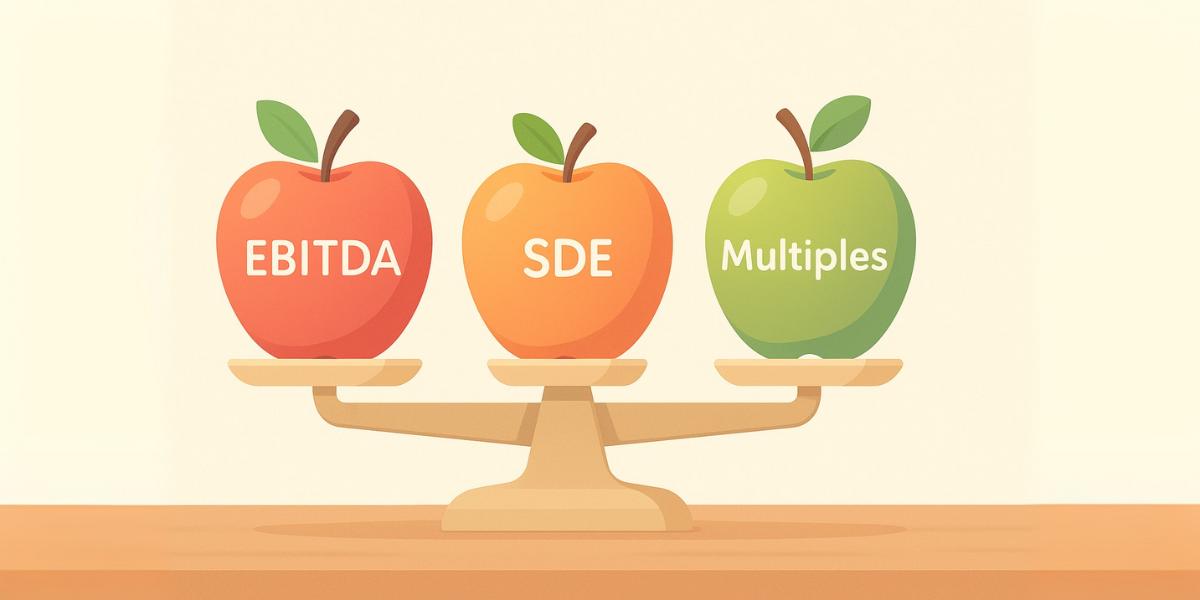One of the most common questions we hear from owners is, “What exactly are buyers looking at when they review my business? ”It’s a fair question. Most owners sell a business only once, so it’s natural to be surprised by how many areas buyers examine before making an offer.
Think of it like preparing your home for a showing. You tidy up, gather documents, and highlight the best features. Selling a business is similar. The more prepared you are, the smoother the conversations and the stronger your negotiating position.
If you’re new to how business valuations work, check out our guide on how to figure out what your business is worth.
Financial Strength, Stability, and Track Record
Buyers rarely look at a single year in isolation. They want a pattern of performance across multiple years because consistency signals reliability.
What buyers review
- Profit and loss statements for at least the last three years
- Tax returns to validate reported results
- Trends in revenue, expenses, margins, customer count, and headcount
A single strong year can be luck. Multiple strong years, including through both good times and downturns, suggest repeatable systems and sound processes. That is what reassures buyers: they can expect similar performance after the transition, not just hope for it.
Example
Two businesses each earned $1 million last year. One has been steady for a decade. The other only recently turned profitable. Even with the same headline number, most buyers will value the first higher because its success appears more repeatable.
For a refresher on how buyers interpret earnings, our guide to multiples, EBITDA, and SDE explains the basics in plain terms.
Seller Tip
Do not wait for due diligence to organize financials. Pull at least three years of clean statements and ensure they reconcile. Clear records save time, build trust, and position your business as professional and well-run.
Team and Delegation
A key question buyers ask is, “Can this business run without the owner?” If the answer is no, perceived risk rises immediately. When too much depends on the founder, buyers worry about customer retention, employee stability, and operational continuity after the handover.
If you have a capable team and clear delegation, it signals durability. Managers who own decisions and staff who maintain customer relationships give buyers confidence that the business will perform when you step back. This topic is explored in Your Training Company Runs on Expertise. Can It Run Without You?
Example
A plumbing company where the owner answers every call feels riskier than one where a manager handles scheduling, technicians handle service, and the operation runs smoothly without the owner’s daily involvement.
Seller Tip
Document roles, build an org chart, and write down key processes. Begin delegating now. The less the business depends on you personally, the more valuable and less risky it appears.
Diversification and Risk Profile
Concentration risk is a common red flag. Revenue concentrated in one or two customers, reliance on a single supplier, or dependence on a single overextended employee all raise concerns.
If one client accounts for 40-50 percent of revenue, buyers will ask, “What happens if that client leaves?” Even strong relationships carry uncertainty, which can affect valuation or deal structure.
By contrast, a business with many customers and stable supplier relationships feels sturdier. A diverse base spreads risk and reassures buyers that the loss of any one account or vendor will not materially damage results.
Example
Two companies each generate $3 million in revenue. One has 50 customers with similar contributions. The other relies on two customers for half of sales. Most buyers will view the first as less risky and will price or structure their offer accordingly.
Seller Tip
Scan for dependency across customers, suppliers, people, products, and channels. Even small steps that reduce concentration make your business safer and more attractive.
For agencies, we’ve broken this down in detail in what buyers really look for in a B2B marketing agency.
Market Position and Growth Potential
Beyond the numbers, buyers ask what makes your business stand out. A company that blends into the crowd is harder to scale or defend. A clear position, such as specialized expertise, a strong reputation, or unique products and services, makes a business more attractive.
What buyers look for
- Repeat customers that demonstrate loyalty
- Long-term contracts that stabilize revenue
- Niche expertise that is hard to copy
- Brand reputation as “the go-to” in your market
Example
A marketing agency focused on B2B SaaS with multi-year contracts is typically more attractive than a generalist shop that relies on one-off projects. Specialization supports stability and clarifies growth paths.
Seller Tip
Show more than topline revenue. Highlight what makes you different: loyal accounts, durable contracts, and proof of expertise. Uniqueness adds value because it suggests both resilience and room to grow.
Final Advice for Sellers
Use this checklist as a guide to prepare, not a hurdle to clear. When your financials are organized, your team is empowered, dependencies are reduced, and your differentiation is clear, conversations move faster, and confidence rises on both sides.
Preparation does more than attract interest. It builds trust and sets the stage for a smooth, respectful transition to the right buyer who values what you have built and sees where it can go next.
Ready to explore your next chapter?
At AA24 Holdings, we review businesses by looking at both the numbers and the people behind them. If you’re considering your options or want an honest perspective on how buyers will evaluate your company, we’d be glad to talk.
Reach us at contact@aa24holdings.com.





